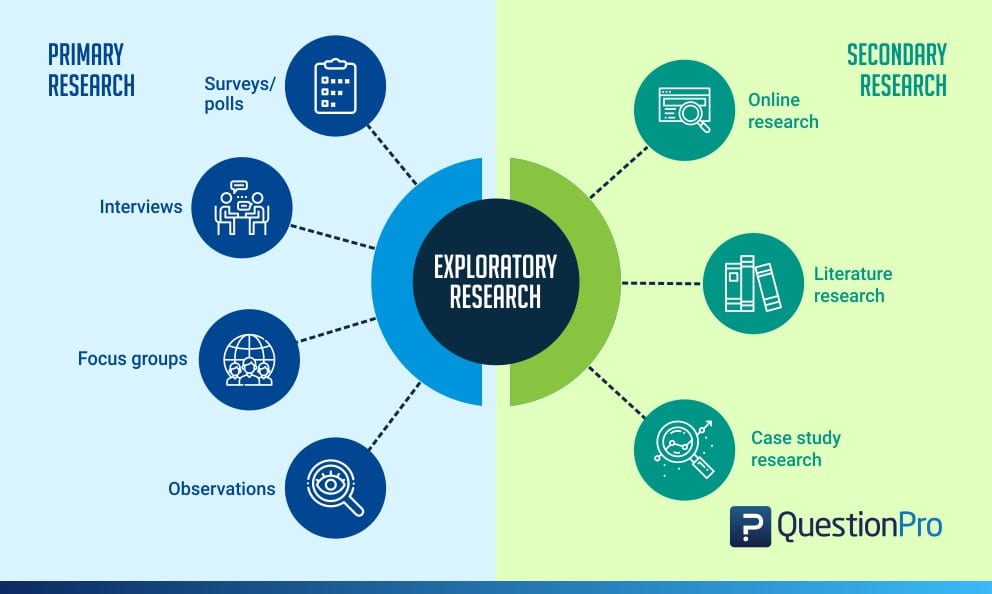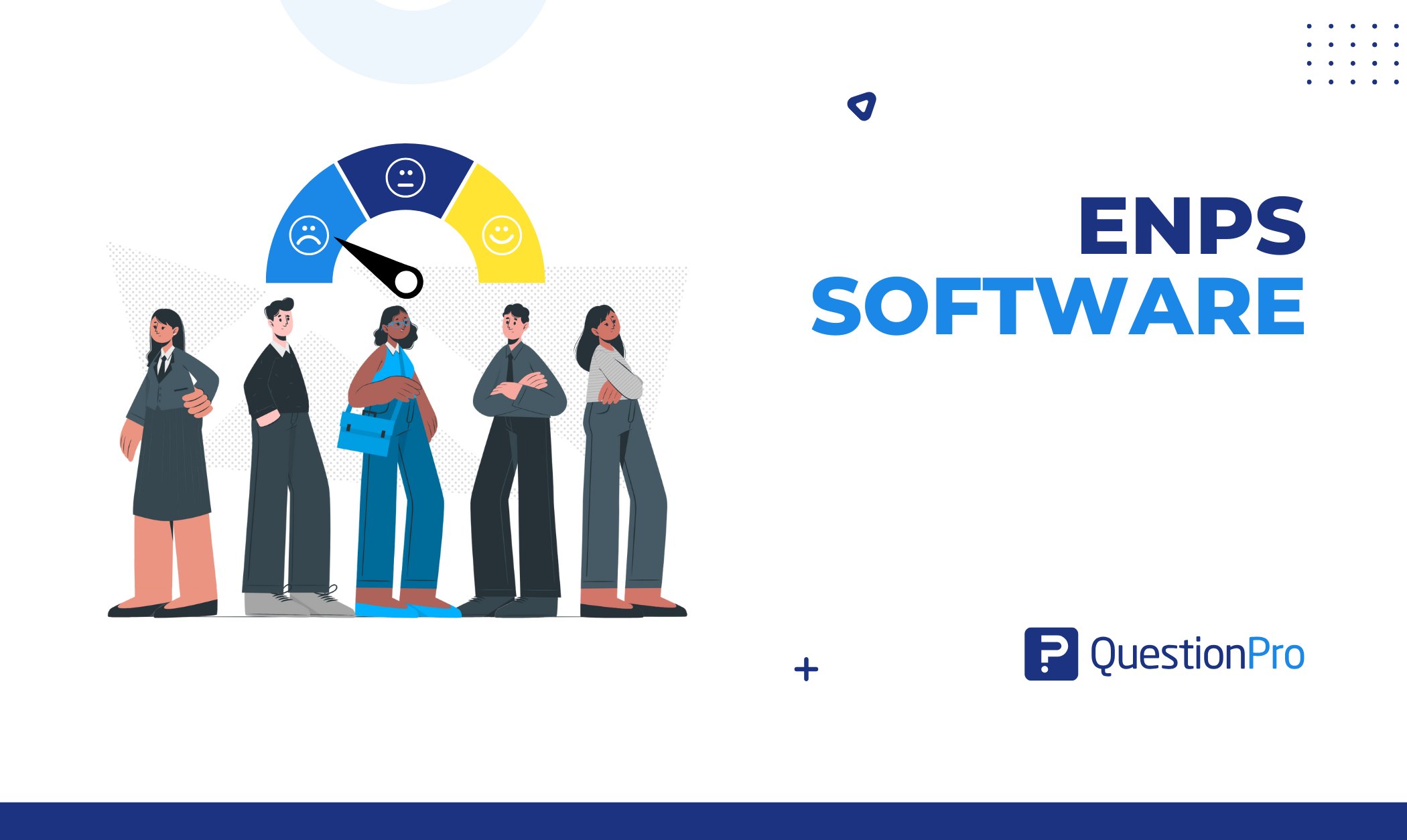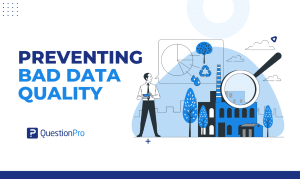
Consider a scenario where a juice bar owner feels that increasing the variety of juices will enable an increase in customers. However, he is not sure and needs more information. The owner intends to conduct exploratory research to find out; hence, he decides to do exploratory research to find out if expanding their juices selection will enable him to get more customers or if there is a better idea.
Another example of exploratory research is a podcast survey template that can be used to collect feedback about the podcast consumption metrics both from existing listeners as well as other podcast listeners that are currently not subscribed to this channel. This helps the author of the podcast create curated content that will gain a larger audience. Let’s explore this topic.
LEARN ABOUT: Research Process Steps
Exploratory research: Definition
Exploratory research is defined as a research used to investigate a problem which is not clearly defined. It is conducted to have a better understanding of the existing research problem, but will not provide conclusive results. For such a research, a researcher starts with a general idea and uses this research as a medium to identify issues, that can be the focus for future research. An important aspect here is that the researcher should be willing to change his/her direction subject to the revelation of new data or insight. Such a research is usually carried out when the problem is at a preliminary stage. It is often referred to as grounded theory approach or interpretive research as it used to answer questions like what, why and how.
Types and methodologies of Exploratory research
While it may sound difficult to research something that has very little information about it, there are several methods which can help a researcher figure out the best research design, data collection methods and choice of subjects. There are two ways in which research can be conducted namely primary and secondary.. Under these two types, there are multiple methods which can used by a researcher. The data gathered from these research can be qualitative or quantitative. Some of the most widely used research designs include the following:
LEARN ABOUT: Best Data Collection Tools
Primary research methods
Primary research is information gathered directly from the subject. It can be through a group of people or even an individual. Such a research can be carried out directly by the researcher himself or can employ a third party to conduct it on their behalf. Primary research is specifically carried out to explore a certain problem which requires an in-depth study.
- Surveys/polls: Surveys/polls are used to gather information from a predefined group of respondents. It is one of the most important quantitative method. Various types of surveys or polls can be used to explore opinions, trends, etc. With the advancement in technology, surveys can now be sent online and can be very easy to access. For instance, use of a survey app through tablets, laptops or even mobile phones. This information is also available to the researcher in real time as well. Nowadays, most organizations offer short length surveys and rewards to respondents, in order to achieve higher response rates.
LEARN ABOUT: Live polls for Classroom Experience
For example: A survey is sent to a given set of audience to understand their opinions about the size of mobile phones when they purchase one. Based on such information organization can dig deeper into the topic and make business related decision.
- Interviews: While you may get a lot of information from public sources, but sometimes an in person interview can give in-depth information on the subject being studied. Such a research is a qualitative research method. An interview with a subject matter expert can give you meaningful insights that a generalized public source won’t be able to provide. Interviews are carried out in person or on telephone which have open-ended questions to get meaningful information about the topic.
For example: An interview with an employee can give you more insights to find out the degree of job satisfaction, or an interview with a subject matter expert of quantum theory can give you in-depth information on that topic.
- Focus groups: Focus group is yet another widely used method in exploratory research. In such a method a group of people is chosen and are allowed to express their insights on the topic that is being studied. Although, it is important to make sure that while choosing the individuals in a focus group they should have a common background and have comparable experiences.
For example: A focus group helps a research identify the opinions of consumers if they were to buy a phone. Such a research can help the researcher understand what the consumer value while buying a phone. It may be screen size, brand value or even the dimensions. Based on which the organization can understand what are consumer buying attitudes, consumer opinions, etc.
- Observations: Observational research can be qualitative observation or quantitative observation. Such a research is done to observe a person and draw the finding from their reaction to certain parameters. In such a research, there is no direct interaction with the subject.
For example: An FMCG company wants to know how it’s consumer react to the new shape of their product. The researcher observes the customers first reaction and collects the data, which is then used to draw inferences from the collective information.
LEARN ABOUT: Causal Research
Secondary research methods
Secondary research is gathering information from previously published primary research. In such a research you gather information from sources likes case studies, magazines, newspapers, books, etc.
- Online research: In today’s world, this is one of the fastest way to gather information on any topic. A lot of data is readily available on the internet and the researcher can download it whenever he needs it. An important aspect to be noted for such a research is the genuineness and authenticity of the source websites that the researcher is gathering the information from.
For example: A researcher needs to find out what is the percentage of people that prefer a specific brand phone. The researcher just enters the information he needs in a search engine and gets multiple links with related information and statistics.
- Literature research: Literature research is one of the most inexpensive method used for discovering a hypothesis. There is tremendous amount of information available in libraries, online sources, or even commercial databases. Sources can include newspapers, magazines, books from library, documents from government agencies, specific topic related articles, literature, Annual reports, published statistics from research organizations and so on.
However, a few things have to be kept in mind while researching from these sources. Government agencies have authentic information but sometimes may come with a nominal cost. Also, research from educational institutions is generally overlooked, but in fact educational institutions carry out more number of research than any other entities.
Furthermore, commercial sources provide information on major topics like political agendas, demographics, financial information, market trends and information, etc.
For example: A company has low sales. It can be easily explored from available statistics and market literature if the problem is market related or organization related or if the topic being studied is regarding financial situation of the country, then research data can be accessed through government documents or commercial sources.
- Case study research: Case study research can help a researcher with finding more information through carefully analyzing existing cases which have gone through a similar problem. Such exploratory data analysis are very important and critical especially in today’s business world. The researcher just needs to make sure he analyses the case carefully in regards to all the variables present in the previous case against his own case. It is very commonly used by business organizations or social sciences sector or even in the health sector.
LEARN ABOUT: Level of Analysis
For example: A particular orthopedic surgeon has the highest success rate for performing knee surgeries. A lot of other hospitals or doctors have taken up this case to understand and benchmark the method in which this surgeon does the procedure to increase their success rate.
Exploratory research: Steps to conduct a research
- Identify the problem: A researcher identifies the subject of research and the problem is addressed by carrying out multiple methods to answer the questions.
- Create the hypothesis: When the researcher has found out that there are no prior studies and the problem is not precisely resolved, the researcher will create a hypothesis based on the questions obtained while identifying the problem.
- Further research: Once the data has been obtained, the researcher will continue his study through descriptive investigation. Qualitative methods are used to further study the subject in detail and find out if the information is true or not.
LEARN ABOUT: Descriptive Analysis
Characteristics of Exploratory research
- They are not structured studies
- It is usually low cost, interactive and open ended.
- It will enable a researcher answer questions like what is the problem? What is the purpose of the study? And what topics could be studied?
- To carry out exploratory research, generally there is no prior research done or the existing ones do not answer the problem precisely enough.
- It is a time consuming research and it needs patience and has risks associated with it.
- The researcher will have to go through all the information available for the particular study he is doing.
- There are no set of rules to carry out the research per se, as they are flexible, broad and scattered.
- The research needs to have importance or value. If the problem is not important in the industry the research carried out is ineffective.
- The research should also have a few theories which can support its findings as that will make it easier for the researcher to assess it and move ahead in his study
- Such a research usually produces qualitative data, however in certain cases quantitative data can be generalized for a larger sample through use of surveys and experiments.
LEARN ABOUT: Action Research
Advantages of Exploratory research
- The researcher has a lot of flexibility and can adapt to changes as the research progresses.
- It is usually low cost.
- It helps lay the foundation of a research, which can lead to further research.
- It enables the researcher understand at an early stage, if the topic is worth investing the time and resources and if it is worth pursuing.
- It can assist other researchers to find out possible causes for the problem, which can be further studied in detail to find out, which of them is the most likely cause for the problem.
Disadvantages of Exploratory research
- Even though it can point you in the right direction towards what is the answer, it is usually inconclusive.
- The main disadvantage of exploratory research is that they provide qualitative data. Interpretation of such information can be judgmental and biased.
- Most of the times, exploratory research involves a smaller sample, hence the results cannot be accurately interpreted for a generalized population.
- Many a times, if the data is being collected through secondary research, then there is a chance of that data being old and is not updated.
LEARN ABOUT: Projective Techniques & Conformity Bias
Importance of Exploratory research
Exploratory research is carried out when a topic needs to be understood in depth, especially if it hasn’t been done before. The goal of such a research is to explore the problem and around it and not actually derive a conclusion from it. Such kind of research will enable a researcher to set a strong foundation for exploring his ideas, choosing the right research design and finding variables that actually are important for the in-depth analysis. Most importantly, such a research can help organizations or researchers save up a lot of time and resources, as it will enable the researcher to know if it worth pursuing.
Learn more: VoIP Survey Questions + Sample Questionnaire Template







